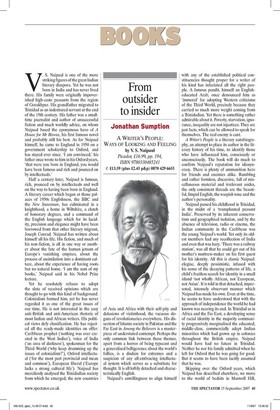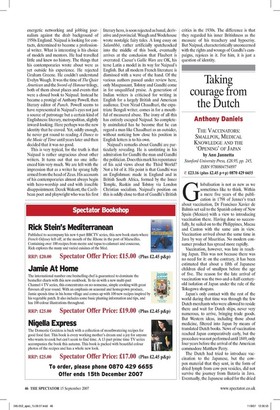From outsider to insider
Jonathan Sumption A WRITER'S PEOPLE: WAYS OF LOOKING AND FEELING by V. S. Naipaul Picador, £16.99, pp. 194, ISBN 9780330485241 £13.59 (plus £2.45 p&p) 0870 429 6655 V.S. Naipaul is one of the more striking figures of the great Indian literary diaspora. Yet he was not born in India and has never lived there. His family were originally impoverished high-caste peasants from the region of Gorakhpur. His grandfather migrated to Trinidad as an indentured servant at the end of the 19th century. His father was a smalltime journalist and author of unsuccessful fiction and much worldly advice, on whom Naipaul based the eponymous hero of A House for Mr Biswas, his first famous novel and probably still his best. As for Naipaul himself, he came to England in 1950 on a government scholarship to Oxford, and has stayed ever since. 'I am convinced,' his father once wrote to him in his Oxford years, 'that were you born in England, you would have been famous and rich and pounced on by intellectuals.'
Half a century later, Naipaul is famous, rich, pounced on by intellectuals and well on the way to having been born in England. A literary career which began at those palaces of 1950s Englishness, the BBC and the New Statesman, has culminated in a knighthood, a home in Wiltshire, a clutch of honorary degrees, and a command of the English language which for its lucidity, precision and elegance might have been borrowed from that other literary migrant, Joseph Conrad. Naipaul has written about himself all his life. His fiction, and much of his non-fiction, is all in one way or another about the fate of the human jetsam of Europe's vanishing empires, about the process of assimilation into a dominant culture, about the experience of having roots but no natural home. 'I am the sum of my books,' Naipaul said in his Nobel Prize lecture.
Yet he resolutely refuses to adopt the slate of received opinions which are thought to go with this kind of background. Colonialism formed him, yet he has never regarded it as one of the great issues of our time. He is not interested in the easy anti-British and anti-American rhetoric of most Indian and African writers. His political views defy classification. He has rejected all the ready-made identities on offer: Caribbean prophet (nothing was ever created in the West Indies'), voice of India (an area of darkness'), spokesman for the Third World (why keep drumming up the issues of colonialism?'), Oxford intellectual (for the most part provincial and mean and common'), European liberal (Europe lacks a strong cultural life'). Naipaul has mercilessly analysed the Trinidadian society from which he emerged, the new countries of Asia and Africa with their self-pity and delusions of victimhood, the vacuous slogans of revolutionaries everywhere. His dissection of Islamic society in Pakistan and the Far East in Among the Believers is a masterpiece of understated contempt. Perhaps the only common link between these themes, apart from a horror of being typecast and a generalised belligerence about the world's follies, is a disdain for extremes and a suspicion of any all-embracing intellectual system which serves as a substitute for thought. It is all loftily detached and characteristically English.
Naipaul's unwillingness to align himself with any of the established political constituencies thought proper for a writer of his kind has infuriated all the right people. A famous pundit, himself an Englisheducated Arab, once denounced him as 'immoral' for adopting Western criticisms of the Third World, precisely because they carried so much more weight coming from a Trinidadian. Yet there is something rather admirable about it. Poverty, starvation, ignorance, inequality are not injustices. They are just facts, which can be allowed to speak for themselves. The real enemy is cant.
A Writer's People is a literary autobiography, an attempt to place its author in the literary history of his time, to identify those who have influenced him, consciously or unconsciously. The book will do much to confirm Naipaul's reputation for idiosyncrasy. There is plenty of ammunition here for friends and enemies alike. Rambling and rather formless, discursive, full of miscellaneous material and irrelevant asides, the only consistent threads are the beautiful, limpid English, the waspish tone and the author's personality.
Naipaul passed his childhood in Trinidad, in the midst of a 'transplanted peasant India'. Preserved by its inherent conservatism and geographical isolation, and by the absence of television, radio or cinema, the Indian community in the Caribbean was the young Naipaul's world. Yet only its oldest members had any recollection of India and even that was hazy. 'There was a railway station', was all that he could get out of his mother's mattress-maker on his first quest for his identity. All this is classic Naipaul: elegiac, deeply pessimistic, infused with his sense of the decaying patterns of life, a child's fruitless search for identity in a small island 'not wholly African, not European, not Asian'. It is told in that detached, impersonal, intensely observant manner which Naipaul has made his own. Even at the time, he seems to have understood that with the approach of independence the world he had known was nearing its end. In Trinidad as in Africa and the Far East, a developing sense of racial identity in the majority community progressively marginalised the educated, middle-class, commercially adept Indian minorities which had grown up in colonies throughout the British empire. Naipaul would have had no future in Trinidad. Neither he nor his family admitted when he left for Oxford that he was going for good. But it seems to have been tacitly assumed that he was.
Skipping over the Oxford years, which Naipaul has described elsewhere, we move to the world of bedsits in Muswell Hill, energetic networking and jobbing journalism against the drab background of 1950s England. Naipaul is looking for contacts, determined to become a professional writer. What is interesting is his choice of models and mentors. He had travelled little and knew no history. The things that his contemporaries wrote about were as yet outside his experience. He rejected Graham Greene. He couldn't understand Evelyn Waugh. It was the time of The Quiet American and the Sword-of-Honour trilogy, both of them about places and events that were a closed book to Naipaul. Instead he became a protégé of Anthony Powell, then literary editor of Punch. Powell seems to have represented in Naipaul's eyes not just a source of patronage but a certain kind of Englishness: literary, metropolitan, slightly inward-looking. Here perhaps was the new identity that he craved. Yet, oddly enough, he never got round to reading A Dance to the Music of Time until years later and then decided that it was no good.
This is very typical, for the truth is that Naipaul is rather ungracious about other writers. It turns out that no one influenced him very much. We are left with the impression that as a writer he sprang fully armed from the head of Zeus. His accounts of his contemporaries almost always begin with hero-worship and end with irascible disappointment. Derek Walcott, the Caribbean poet and playwright who was his first literary hero, is soon rejected as banal, derivative and provincial. Waugh and Wodehouse wrote nostalgic fairy tales. A long essay on Salambbo, rather artificially spatchcocked into the middle of this book, eventually arrives at the conclusion that Flaubert is overrated. Caesar's Gallic Wars are OK, his terse Latin a model in its way for Naipaul's English. But all modern French literature is dismissed with a wave of the hand. Of the various authors passed under review here, only Maupassant, Tolstoy and Gandhi come in for unqualified praise. A generation of Indian writers is criticised for writing in English for a largely British and American audience. Even Nirad Chaudhuri, the expatriate Bengali writer, comes in for a mouthful of measured abuse. The irony of all this has entirely escaped Naipaul. So completely assimilated has he become that he can regard a man like Chaudhuri as an outsider, without noticing how close his position in English letters is to his own.
Naipaul's remarks about Gandhi are particularly revealing. He is unstinting in his admiration for Gandhi the man and Gandhi the politician. Does this mark his repentance of his acid views about the Third World? Not a bit of it. His point is that Gandhi was an Englishman: made in England and in British South Africa, formed by the Inner Temple, Ruskin and Tolstoy via London Christian socialism. Naipaul's position on this is oddly close to that of Gandhi's British critics in the 1930s. The difference is that they regarded his inner Britishness as the measure of his treachery and hypocrisy. But Naipaul, characteristically unconcerned with the rights and wrongs of Gandhi's campaigns, rejoices in it. For him, it is just a question of identity.


























































 Previous page
Previous page